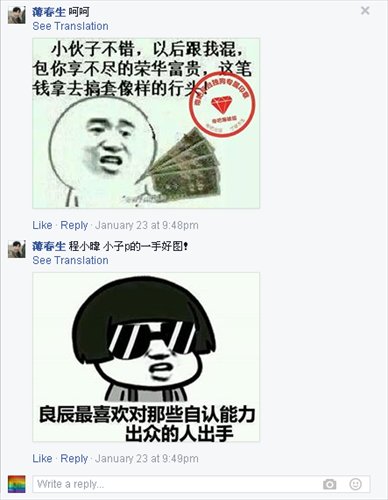
Ren Zhiqiang, a retired real estate icon, called this act "a form of class struggle."
Likewise, the reaction on the Taiwan side was emotional as well. Many people in the island expressed annoyance, calling the bombardment trolling and online spamming, while others started fighting back. Many posts surfaced of people in Taiwan picking faults with the mainland, talking about corruption, the "lack of freedom" and other social issues.
But still others pointed out this is a typical online phenomenon and shouldn't be made a fuss over.
Yang Xuedong, a research fellow at the Central Compilation and Translation Bureau, said he thinks this event showed the public venting their emotions rather than making a political statement.
"The Internet era has given the public more ways to express themselves … many people have a sense of participation," he said. "Participants don't care about their identities; they just want to be seen, to get attention."
The attitude was present during this "war." When the "troops" stormed Taiwan public figures' Facebook pages, many weren't looking to communicate with the other side, but were only stating their own thoughts.
Many netizens also joined in for fun, to feel a sense of participation.
Gong Chiqiu, a novelist who joined a Di Ba chat group to watch the "battle," said he saw unprecedented enthusiasm among members.
"People were pretty riled up, they kept posting messages in the group in a speedy manner," he said.
At the same time, songs were being played in the background to keep up people's spirits. It was truly an online rally.
Patriotic undercurrent
This rally was in part driven by patriotism, a strand which was also apparent in past Di Ba conquests.
In the past, Di Ba has led other battles that stemmed from social issues.
In 2007, members spammed the fan forum of Rainie Yang, a Taiwan singer, because when she was told the anti-Japanese invasion war lasted for eight years on a TV show, she commented "Only eight years?" Enraged, members went to her forum and posted over 100 pages of messages within two hours.
One commander, who used the name "GK-Loma," said the flood of comments aimed to help others understand a "true China, a beautiful China, a China without warfare."
The 24-year-old stayed up for two nights planning the raid. He was present throughout the whole event, from the initial planning, to battlefield designation, to summarizing the events after they were over.
On Di Ba's official social media accounts, the theme was also stressed. All the way through the "battle," the organizers called for members to remain calm and reasonable, as well as calling out for more materials presenting the mainland's scenery and food to show the Taiwan public.
Xiang said as the battle went on, she saw more and more people choosing to post photos and text that showed the mainland's development in technology and society, and how rich the history and culture are, instead of just posting stickers and emojis.
Administrators in her group also directed the "troops" towards people posting pro-Taiwan independence arguments or demeaning comments concerning the mainland and members flocked there to argue back.
But now, nearly a week after the initial "crusade," it doesn't seem to matter whether this online battle brought positive or negative effects to the relationship across the Straits, as it ended with a surprising twist.
Over the weekend, a gradual shift in tone occurred. Instead of arguing back and forth, netizens across the Straits started discussing food, travel, TV shows, and many even started posting their own photos and turned the Facebook "battlegrounds" into dating sites. People from Taiwan also joined the groups and started asking questions about the mainland.
A spokesperson for Di Ba told the media that this change was surprising and organizers felt "brotherly warmth," according to guancha.com.
"Our goal is to build a platform for communication for young people across the Straits with the premise of mutual respect and understanding," he said. "That goal has not yet been realized, but it's a wish for all mainlanders."
Some netizens commented on the page about the surprising turn of events, saying "change came too fast, faster than a tornado." But many welcomed the change. Even though the "crusade" originated from differences in political stance, young netizens say they found they stem from the same culture and speak the same language, and there's willingness on both sides to communicate.
"In the end, it occurred to us that the people in Taiwan don't really know much about the mainland … so they became curious and we started talking," Xiang said. "What can I say? No discord, no concord, I guess."


















































